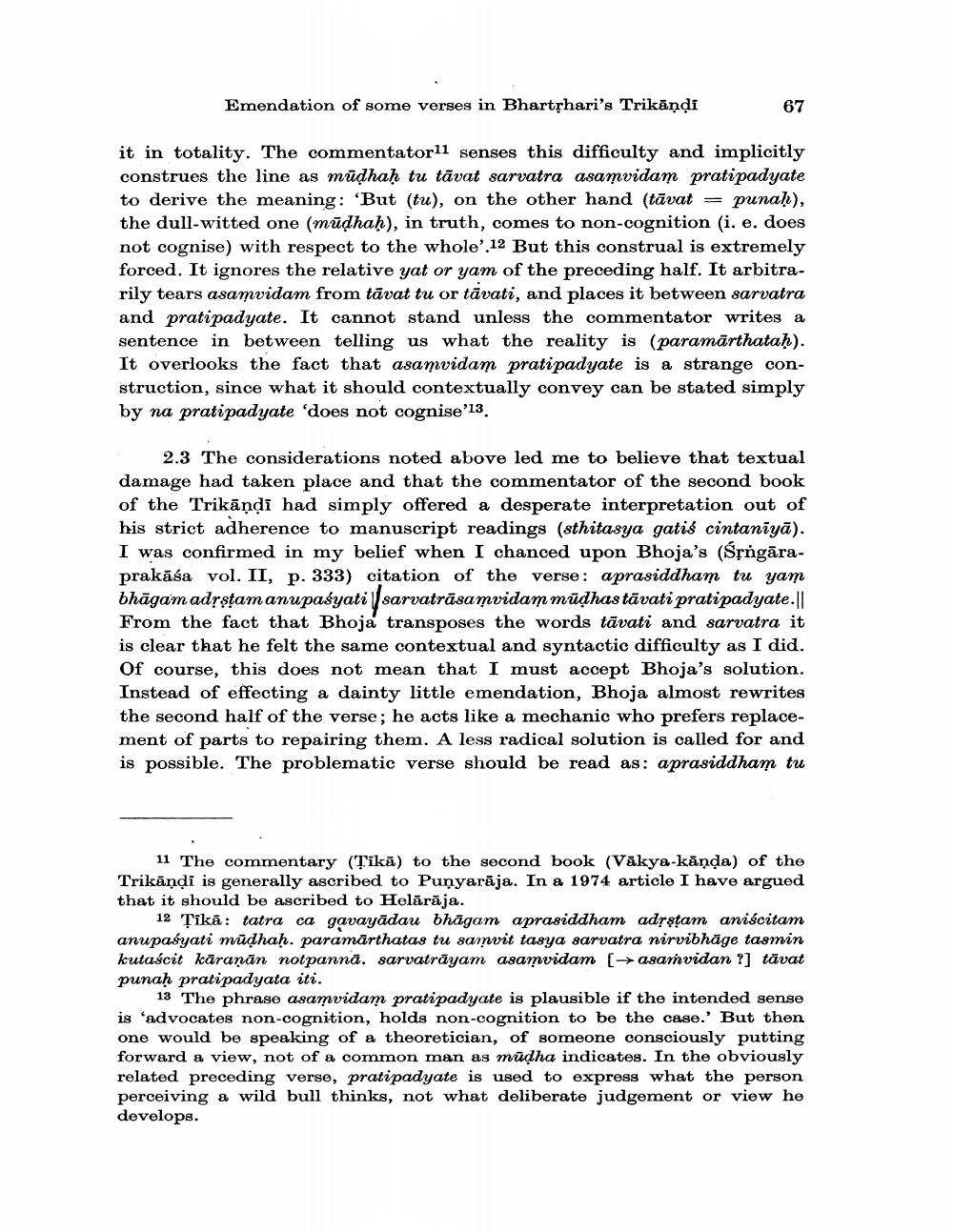Book Title: Emendation Of Some Verses In Bhrtharis Trikandi Author(s): Ashok Aklujkar Publisher: Ashok Aklujkar View full book textPage 5
________________ Emendation of some verses in Bhartshari's Trikāņdi 67 it in totality. The commentatorll senses this difficulty and implicitly construes the line as mudhah tu tāvat sarvatra asamvidam prati padyate to derive the meaning: 'But (tu), on the other hand (tāvat = punaḥ), the dull-witted one (mūdhah), in truth, comes to non-cognition (i. e. does not cognise) with respect to the whole'.12 But this construal is extremely forced. It ignores the relative yat or yam of the preceding half. It arbitrarily tears asamvidam from tāvat tu or tāvati, and places it between sarvatra and pratipadyate. It cannot stand unless the commentator writes a sentence in between telling us what the reality is (paramārthatah). It overlooks the fact that asamvidam prati padyate is a strange construction, since what it should contextually convey can be stated simply by na prati padyate 'does not cognise’13. 2.3 The considerations noted above led me to believe that textual damage had taken place and that the commentator of the second book of the Trikāņdi had simply offered a desperate interpretation out of his strict adherence to manuscript readings (sthitasya gatiś cintanīyā). I was confirmed in my belief when I chanced upon Bhoja's (Śộngāraprakāśa vol. II, p. 333) citation of the verse: aprasiddham tu yam bhāgam adrstam anupaśyati sarvatrāsamvidam mūdhastāvati prati padyate. From the fact that Bhoja transposes the words tāvati and sarvatra it is clear that he felt the same contextual and syntactic difficulty as I did. Of course, this does not mean that I must accept Bhoja's solution. Instead of effecting a dainty little emendation, Bhoja almost rewrites the second half of the verse; he acts like a mechanic who prefers replacement of parts to repairing them. A less radical solution is called for and is possible. The problematic verse should be read as: aprasiddham tu 11 The commentary (Tikā) to the second book (Vākya-kānda) of the Trikāndi is generally ascribed to Punyarāja. In a 1974 article I have argued that it should be ascribed to Helārāja. 12 Tika: tatra ca gavayādau bhāgam aprasiddham adrstam aniścitam anupaśyati mudhah. paramārthatas tu samvit tasya sarvatra nirvibhāge tasmin kutaścit käranān notpanna. sarvatrāyam asamvidam [ asaṁvidan ?] tāvat punah prati padyata iti. 13 The phrase asamvidam prati padyate is plausible if the intended sense is 'advocates non-cognition, holds non-cognition to be the case. But then one would be speaking of a theoretician, of someone consciously putting forward a view, not of a common man as mūdha indicates. In the obviously related preceding verse, prati padyate is used to express what the person perceiving a wild bull thinks, not what deliberate judgement or view he develops.Page Navigation
1 ... 3 4 5 6 7 8 9 10 11 12
